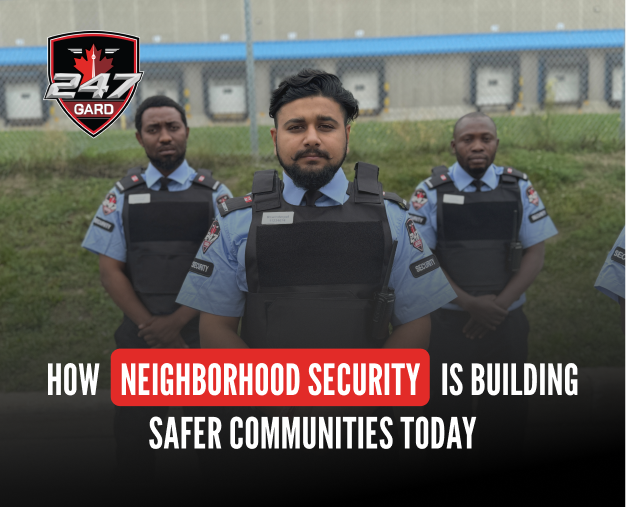Combating Organized Retail Crime: Strategies and Collaborations
- By - 247 Gard
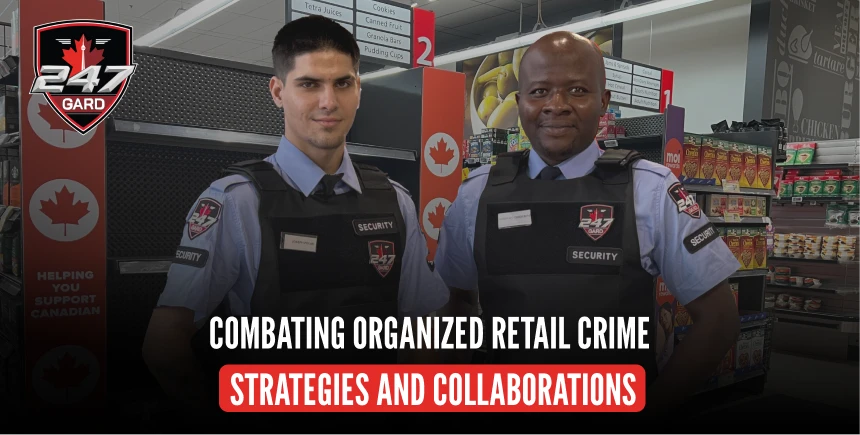
Organized retail crime is no longer limited to shoplifting. It has evolved into a highly coordinated, multi-store threat that affects product margins, endangers staff, and disrupts operations. Canadian retailers today face targeted, intelligent theft operations that go beyond petty crime. These groups exploit in-store vulnerabilities, adapt to countermeasures, and often operate across jurisdictions.
247 Gard provides on-ground security services tailored for the retail sector. We provide trained, uniformed personnel who deter, detect, and de-escalate criminal activity before it affects your bottom line.
Understanding the Scale of Organized Retail Crime in Canada
Organized retail crime in Canada has grown in frequency and impact. It involves coordinated theft operations by multiple individuals who plan entry, distraction, item collection, and exit strategies. In cities like Toronto, Vancouver, and Calgary, retailers have reported mass grab-and-run incidents during opening hours, often involving designer apparel, electronics, or over-the-counter drugs.
A recent report by the Retail Council of Canada found that retailers have seen a >20% increase in theft-related losses year over year, particularly from organized crime groups. These losses are not random. They are orchestrated by individuals who study store layouts, assess security presence, and move quickly through soft targets.
Retailers affected include high-end fashion outlets, electronics retailers, pharmacies, and even mid-size convenience chains. And while surveillance technology helps with documentation, it doesn’t stop a theft in progress.
Security Risks Unique to Retail Environments
Retail stores present a very specific security challenge. Unlike industrial or office spaces, they must remain open, inviting, and accessible to the public. This openness creates numerous entry points for theft—both physical and procedural.
Here are key retail-specific risks that organized retail crime groups exploit:
- Open floor layouts with minimal staff supervision in high-value zones like electronics or cosmetics
- Unsecured fitting rooms, often used to hide merchandise or remove tags
- Seasonal staffing issues, where temporary or understaffed shifts are easier to overwhelm
- Poorly monitored backrooms, which allow internal theft or collusion with external actors
- Distracted front-of-house staff, especially during busy hours or promotional events
- Lack of staff training on how to respond to aggressive or coordinated shoplifting attempts
Many of these risks stem from the operational demands of retail businesses. Stores must move fast, serve customers, and meet sales targets—all while staying secure. This creates predictable blind spots that organized retail crime groups exploit with precision.
What On-Site Security Guards Do Differently
Retailers may invest in alarms and CCTV, but without physical enforcement, these systems remain reactive. On-site security guards offer proactive deterrence and immediate response. They do not just watch screens or check doors—they insert an unpredictable variable into every criminal’s plan.
247 Gard officers are trained to detect behaviors associated with organized retail crime. This includes:
- Monitoring for groups working in tandem
- Spotting repeat visitors who case the store before acting
- Noticing fast movements between exits and high-value shelves
- Identifying tag removal or bag stuffing gestures
- Intervening non-aggressively to de-escalate suspicious behavior
Our guards also work closely with retail managers to understand foot traffic patterns, seasonal trends, and vulnerable inventory. They become part of the store’s rhythm, not a passive fixture.
High-Risk Zones Inside Retail Stores
Every retail store has areas that attract theft attempts. These zones are targeted based on ease of access, line-of-sight obstructions, and lack of employee presence.
Key high-risk zones include:
- Fitting Rooms: Used to conceal merchandise or strip security tags
- Entrance Displays: First point of attack in grab-and-run tactics
- Stock Carts and Replenishment Areas: Items often go missing during restocking
- Cash Wraps and POS Areas: Thieves distract staff while accomplices act elsewhere
- Backdoor Exits: Vulnerable to both internal and external manipulation
- Blind Corners: Used by groups to temporarily stash merchandise
247 Gard positions guards to patrol and rotate around these zones throughout their shift. Our security personnel are not stationary—they remain in motion and actively monitor the sales floor in coordination with staff.
Why Retailers Cannot Rely on Technology Alone
Security cameras and anti-theft tags are useful—but organized retail crime groups already know how to work around them. They use foil-lined bags, team coordination, and fake identities to confuse systems. More importantly, cameras don’t respond in real-time.
Retail security solutions must integrate human oversight. A guard can intercept a suspect, initiate verbal engagement, and notify management instantly. They also serve as witnesses during police investigations—adding credibility and accountability to post-incident reviews.
At 247 Gard, our guards are trained to follow retail loss prevention techniques such as non-confrontational tracking, maintaining safe distances, and notifying authorities when thresholds are met. This combination of presence and process fills the critical gap that static security systems leave open.
The Role of Retail Crime Partnerships and Information Sharing
No single store, franchise, or retail brand can tackle organized retail crime alone. These groups operate across store chains, provinces, and even countries. Effective retail crime partnerships allow for the sharing of suspect profiles, incident patterns, and geographic trends.
Retail crime collaboration includes:
- Partnering with mall security and other retailers to exchange real-time alerts
- Submitting offender profiles to law enforcement or industry crime databases
- Engaging with a retail crime task force in major metro areas to report patterns
- Participating in monthly or quarterly meetings to review recent threats
- Working with private security providers like 247 Gard to compile internal intelligence
Our security teams participate in these collaborations when authorized. We track repeat offenders across locations and submit formal incident logs to help retail groups build consistent cases.
How Retailers Can Build a Proactive Defense Strategy
Having security guards is one step. Integrating them into your store’s workflow is what truly strengthens defense.
Here are practical steps to create a proactive security strategy:
- Conduct regular risk audits with your security provider to assess store vulnerabilities
- Adjust security shifts during product launches, holidays, or promotional campaigns
- Pair security patrols with staff briefings so that floor teams and guards share observations
- Keep an incident log accessible to managers and security for pattern detection
- Empower guards to suggest layout adjustments that improve visibility or deter concealment
- Ensure clear communication channels between management, staff, and the guard team
247 Gard conducts monthly operational reviews with our retail clients to refine these processes. We don’t just deploy guards—we embed them into your store’s daily rhythm so that crime prevention becomes part of your operating culture.
Where Internal Theft Meets External Threat
Organized retail crime sometimes involves internal cooperation—often unknowingly. Staff may be distracted, manipulated, or simply unaware of cues. In some rare cases, dishonest employees may tip off external groups.
Our guards are trained to monitor internal behaviors just as much as customer activity. This includes unusual staff movements, unscheduled exit use, or staff members who create intentional blind spots during shifts.
By observing both customer and staff activity, 247 Gard ensures that retail loss prevention strategies are comprehensive, not one-sided.
Staying Ahead of Evolving Retail Crime Tactics
Organized retail crime is constantly evolving. From booster bags to fake returns, groups are experimenting with new methods regularly. Stores must remain one step ahead through continued education and response readiness.
At 247 Gard, we update our guard training modules every quarter to reflect the latest organized retail crime strategies. Whether it’s holiday season flash mobs, power-outage theft attempts, or fake delivery entry, our guards are prepared to adapt in real time.
Retailers are no longer fighting isolated incidents. They are defending their revenue, their staff’s safety, and their store’s reputation.
Conclusion: Build Your Store’s First Line of Defense With 247 Gard
Organized retail crime affects more than inventory—it threatens staff safety, customer confidence, and store sustainability. Retailers need trained, professional guards who act as a first line of defense—not just against theft but against reputational damage and operational disruption.
247 Gard provides specialized security services tailored to the retail environment. Our guards are trained in de-escalation, floor patrolling, and collaborative threat reporting. We support your team, reinforce your policies, and act before crime strikes.
To explore how our guards can support your retail operations, contact us for a customized security assessment today.
Recent Posts
Blogs
Your Source for Safety News
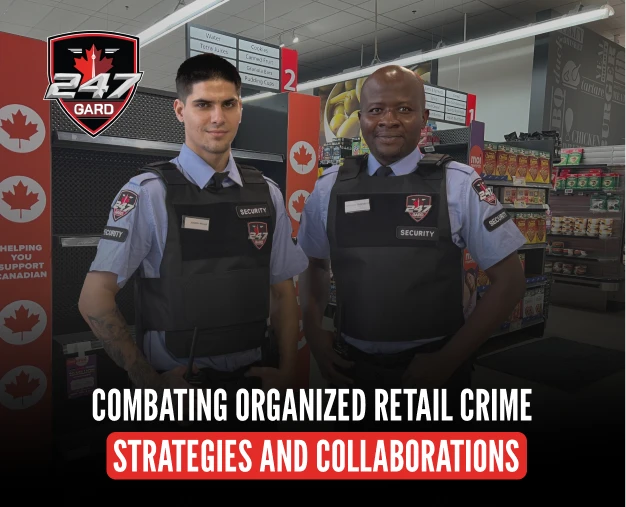
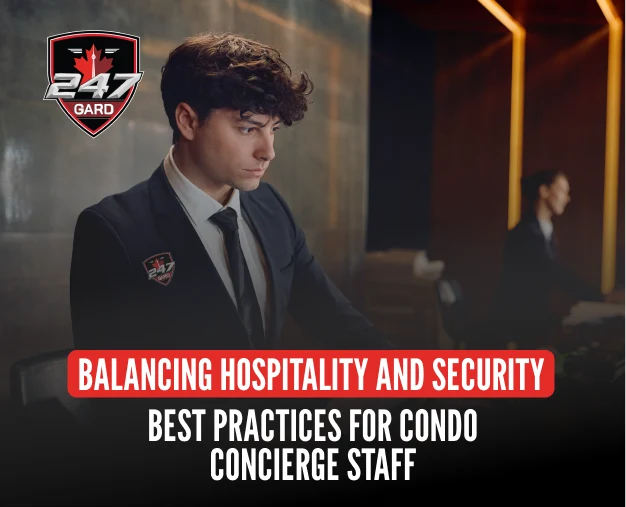

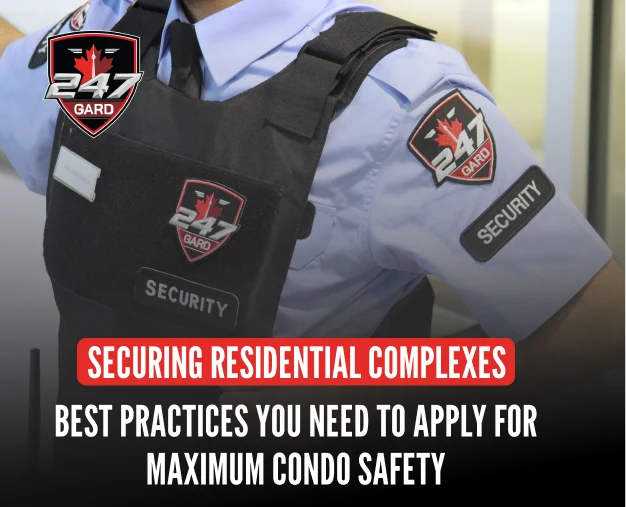
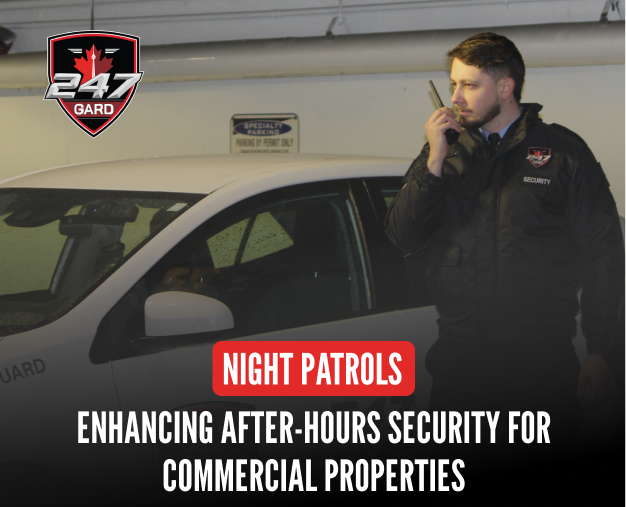
Combating Organized Retail Crime: Strategies and Collaborations Organized retail crime is no longer limited to shoplifting. It has evolved into a highly coordinated, multi-store threat that affects product margins, endangers
Protecting High-Profile Individuals: An Introduction to 247 Gard’s Executive Protection High-profile individuals attract more than attention. They attract risk. From executives to celebrities, visibility creates vulnerabilities in unpredictable environments. Canadian
A Dual Expectation for Modern Condo Living Condominium living continues to evolve as more residents seek environments that blend comfort with protection. In this environment, the role of the condominium
Why Do Residential Complexes Need Professional Security Services? In today’s urban environment, relying solely on concierge staff or DIY security measures is no longer enough. While these solutions may offer
Night Patrols: Enhancing After-Hours Security for Commercial Properties Every 45 seconds, a business in Canada falls victim to property crime, with most incidents occurring after regular business hours. This data,
Lorem ipsum dolor sit amet, consectetur adipiscing elit. Ut elit tellus, luctus nec ullamcorper mattis, pulvinar dapibus leo.

